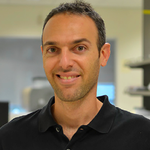The William Richard Gordon President’s Distinguished Professor in Genetics
 Created in 2018 by George A. Weiss, this Professorship honors William Richard “Dick” Gordon (1913-1993), a Wharton graduate ('36) who served the University for 46 years and as Treasurer of the University for 20 years. As Treasurer, Mr. Gordon designed the investment strategy for the University’s endowment funds. He then became President of the Franklin Investment Company, which managed the University’s endowment in the 1970s until his retirement in 1982. Mr. Gordon also was Treasurer of the Hospital of the University of Pennsylvania, Treasurer of Graduate Hospital and an instructor at Wharton. Before becoming Treasurer, he served as Coast Artillery Drill Master and Captain in the General Staff Corps at the Pentagon. He was a 51-year member of the Delta Psi fraternity.
Created in 2018 by George A. Weiss, this Professorship honors William Richard “Dick” Gordon (1913-1993), a Wharton graduate ('36) who served the University for 46 years and as Treasurer of the University for 20 years. As Treasurer, Mr. Gordon designed the investment strategy for the University’s endowment funds. He then became President of the Franklin Investment Company, which managed the University’s endowment in the 1970s until his retirement in 1982. Mr. Gordon also was Treasurer of the Hospital of the University of Pennsylvania, Treasurer of Graduate Hospital and an instructor at Wharton. Before becoming Treasurer, he served as Coast Artillery Drill Master and Captain in the General Staff Corps at the Pentagon. He was a 51-year member of the Delta Psi fraternity.
More than a half dozen Gordon family members, stretched over four generations, have graduated from Penn. In 1955, Mr. Gordon donated to Penn the “University Mace”—the majestic, gold-washed silver and ebony mace that has become a treasured Penn symbol. The mace was donated in honor of Mr. Gordon’s father, William Murray Gordon, MD, a 1910 graduate of the University's School of Medicine, and is now housed in the President's office.
President’s Distinguished Professorships are awarded to eminent faculty members with research and teaching expertise in areas identified by Penn’s President as high priorities. The creation of President’s Distinguished Professorships at the Perelman School of Medicine has been supported by the challenge gift of Penn University Trustees and Penn Medicine Board members George A. Weiss and Richard W. Vague.
 Current Chairholder
Current Chairholder
Nicolas Plachta, PhD
Nicolas Plachta, PhD is the William Richard Gordon President’s Distinguished Professor in Genetics. Recruited to the University of Pennsylvania’s Perelman School of Medicine with the Professorship in 2019, he had previously earned his BSc at Tel Aviv University and his PhD at the University of Basel in Switzerland. He completed postdoctoral training at the California Institute of Technology, with support from the Swiss National Science Foundation and the European Molecular Biology Organization. He has held appointments at the European Molecular Biology Laboratory (EMBL) Australia; the Australian Regenerative Medicine Institute; the Agency for Science, Technology and Research in Singapore; and the Institute of Zoology, State Key Laboratory of the Chinese Academy of Sciences in Beijing.
Employing live, single-cell imaging techniques, Dr. Plachta’s lab studies in real time the interaction of all cell constituents to guide the earliest stages of embryonic life. His lab has pioneered the use of these live-imaging approaches to discover how the early mammalian embryo forms. His long-term goals are to discover the major processes controlling the formation of the early embryo, establish how these mechanisms work at the molecular level, and determine how diverse mechanisms operating at the level of DNA-proteins, epigenetics, cytoskeletal elements, and morphogenetic changes are integrated within each cell to assemble a complex organism.
Dr. Plachta has published his findings in high-impact journals including Nature, Science, Cell, Developmental Cell, Nature Communications, and Nature Cell Biology. His international accolades include the prestigious European Molecular Biology Organization (EMBO) Young Investigator Award, a Howard Hughes International Scholar Award, and the American Society of Cell Biology’s ASCB-Gibco Emerging Leader Prize.

